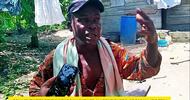Turkey's Ayka Investment is in the process of withdrawing its investment in cotton production in the Lower Omo Valley on the advice of its German customer Tchibo which has raised concerns about cotton projects in the area.
- Ecotextile News
-
15 January 2015
Kenyans near world’s largest desert lake predict conflict, hunger and cultural devastation when hydroelectric project and sugar plantations are completed.
Ethiopia is building huge dams and plantations in the Omo River Valley, displacing its own people in addition to causing lost livelihoods in Kenya.
- International Rivers
-
08 January 2015
The construction of a huge dam in Ethiopia and the introduction of large-scale agricultural businesses has been controversial, and finding out what local people think can be hard.
The executive supervising MIDROC's Ethiopian agriculture projects talks to The Africa Report about how rocketing consumption has been an opportunity for the company.
- Africa Report
-
05 January 2015
Commercial farming, with its vast tracts of land, is running into problems in Ethiopia’s Gambella region – and local communities are reaping few benefits
More than 300,000 people were asked to clear an area the size of Belgium to pave the way for a program with the prime purpose of leasing or selling lands to foreign investors.
Saudi Star Agricultural Development Plc, an Ethiopian company owned by billionaire Mohamed al-Amoudi, said it plans to invest $100 million in a rice farm in western Ethiopia next year to kick-start the stalled project.
- Bloomberg
-
03 December 2014
Sweden's TV4 investigates the multinational retail clothing company H&M's possible involvement in landgrabbing in Ethiopia.
Fashion retailer has instructed its suppliers to ensure they do not use cotton from the Omo Valley, where there is an increased risk of land-grabbing - but admits it cannot provide an absolute guarantee.
- just-style
-
12 November 2014
The Ethiopian government has embarked on a large-scale land investment policy that has led to the displacement and forced eviction of Ethiopia’s most marginalized traditional societies.
Swedish TV4 said H&M was using cotton from areas in Ethiopia vulnerable to land grabbing -- the buying or leasing of land in developing countries, often by foreign companies, without the consent of affected local communities.















